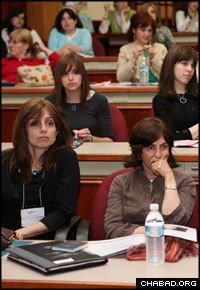Hundreds of Chabad on Campus emissaries gathered for their largest-yet international conference, spending an extended weekend in the Catskill Mountains of New York discussing best practices and examining new programs. The seventh-annual event comes on the heels of a rapid expansion of university Chabad-Lubavitch centers.
“The conference grows every year, but this year, it was one of the best, in terms of the opportunities for the emissaries and their families,” reported Rabbi Menachem Schmidt, president of the Chabad on Campus International Foundation and executive director of the Lubavitch House at the University of Pennsylvania. “It’s an extremely energizing experience which gives the emissaries the tools they need to continue their urgently important work, and to constantly grow in new and innovative ways.”
Although the conference officially began on June 26, one day after the 15th anniversary of the passing of the Rebbe, Rabbi Menachem M. Schneerson, of righteous memory, a prelude-of-sorts took place at the Jewish Children’s Museum in Brooklyn, N.Y., two days earlier with an executive session with philanthropist George Rohr, whose family has provided much of the financial support to Chabad on Campus’ growth in numbers and programs.
Both the museum event and the wider conference had the feel of a family reunion, with emissaries greeting one another for the first time since last year’s gathering.
“It is nice to see so many people in the same boat,” marveled Zeesy Greenbaum, co-director of Chabad at the College of New Jersey and Ewing.
Learning Programs Expand
In his address, Rohr referred to the Rebbe in helping to chart a course for the following year.
“I visited the Ohel on Sunday,” said Rohr, using the term for the Rebbe’s resting place in Cambria Heights. “And in the drizzle, I tried to visualize what the Rebbe would say to you if he were here in the flesh tonight.
“If we think back to the great strides that have been made, and the impact that you all, and this enterprise, has been having, the Rebbe would not give a yasher koach,” a verbal congratulatory pat-on-the-back, continued Rohr. “He would give us blessings to be successful beyond what we are [currently] doing.”
In archived videos of people speaking to the Rebbe about their various successes, Rohr pointed out, the Rebbe would not indicate his satisfaction. “No, the Rebbe wants us to keep moving forward.”
Rohr also announced a greater focus on innovative Torah education programs.
“It is vital that Torah learning become as important as experiential learning on campuses,” he said.
Before Rohr took to the podium, Schmidt presented the results of this year’s IsraeLinks program, an intensive study-based tour of the Holy Land for students who had previously visited on free tours offered by Taglit-Birthright Israel. This summer, two busloads of students took part in the program.
“The topics that were covered during the morning classes were a springboard for discussions all throughout the day,” said Yehudis Bluming, co-director of the Chabad House serving the University of North Carolina and Duke University.
According to Bluming, one of the coordinators of the IsraeLinks program, students who had never before had a bar or bat mitzvah were able to have one at the Western Wall. During the trip, two of the men acquired their own pairs of tefillin, and eight students chose to remain in Israel to continue their summer studies in yeshiva. Of that group, seven decided to attend the Mayanot Institute of Jewish Studies, a Chabad educational center in Jerusalem.
In the question-and-answer session following Rohr’s speech, Shaindel Hecht, co-director of Chabad at the University of Connecticut, remarked that it was due to the Sinai Scholars Society, a joint educational program between Chabad on Campus and the Rohr Jewish Learning Institute, that their Chabad House “has attracted many more students.”
Her husband, Rabbi Shlomo Hecht, agreed.
“Campus leaders have reached out to us,” he said, noting that the program fostered a structure and dedication to Torah study that the students appreciated.
Toward the end of the evening, Rabbis Mendy Fellig of the Chabad House serving the University of Miami and Yossi Lazaroff, co-director of the Chabad Jewish Student Center serving Texas A&M University, presented Rohr with an album of pictures of Chabad on Campus emissaries and their Chabad Houses’ activities.
“We want you to have a part of us,” said Lazaroff. “We are proud to be in it and proud to be a part of Chabad on Campus.”




Start a Discussion